AI tools for ecommerce are software using machine learning and natural language processing to help online stores engage with customers and personalize experiences. These systems help businesses improve customer experience, boost sales, and automate workflows for higher efficiency.
But which tools to use for your brand?
We spent over 40 hours comparing the best options on the market, and we’ll share our findings with you.
Here’s a comparison table of the best AI tools for ecommerce:
| Tool | Rating | Free plan | Best for |
|---|---|---|---|
| Tidio | 4.7/5 ⭐️ | ✅ | Lyro AI chatbot for customer service |
| Jasper | 4.7/5 ⭐️ | 7-day free trial | Dynamic templates for content writing |
| Optimonk | 4.8/5 ⭐️ | ✅ | Smart pop-ups and A/B testing |
| Freepik AI Background Remover | 4.7/5 ⭐️ | ✅ | Automatic background remover |
| Surfer AI | 4.8/5 ⭐️ | 7-day free trial | Content audit |
| Visenze | 4/5 ⭐️ | 30-day free trial | Personalized product discovery |
| Marketmuse | 4.6/5 ⭐️ | 7-day free trial | Structured content briefs and optimization |
| Synthesia | 4.7/5 ⭐️ | ✅ | Rapid video content creation |
| Salesforce Einstein | 4.4/5 ⭐️ | 30-day free trial | Personalized customer/merchant experience |
| Chatfuel | 4.5/5 ⭐️ | 7-day free trial | Personalized product recommendations |
| Pixelcut | N/A | ✅ | Precision video background removal |
What to look for in an AI solution for ecommerce
Artificial intelligence is broad. It involves multiple models and technologies that improve user experience and support while driving sales growth.
Below are some of the top characteristics present in most AI for ecommerce software:
- Natural language processing: NLP algorithms help virtual assistants understand and respond to customer inquiries in a natural language
- Machine learning: ML is a smarter way of analyzing customer inquiries, reviews, and complaints to establish patterns and predictions on what customer needs are
- Customization: AI business tools are helpful when trying to customize marketing messages, as suggestions made are contextual and personalized to any given audience
Benefits of AI tools for ecommerce
Thanks to technology, any business can have an ecommerce site or digital storefront in a matter of minutes. And AI today impacts the shopping journey, enabling highly automated and intelligent interaction, resulting in higher customer satisfaction.
- Improved customer experience: AI chatbots and intelligent virtual assistants help to deliver instant and accurate support to shoppers. In fact, about 62% of companies use AI to enhance customer service, and 36% of them utilize it to boost client satisfaction.
- Higher personalization: AI analyzes customer data to send targeted marketing messages and tailored product recommendations. And those can drive sales by as much as 10% to 15%.
- Increased efficiency: AI tools for ecommerce result in a decrease of repetitive manual tasks that are low-value-yielding despite improving overall productivity. It’s good to note that a survey shows 60% of companies intend to boost their AI investments.
- Improved analytics: With improved analytics, you understand your customers’ behavior and align your marketing strategies accordingly. AI forecasting shows that the technology can lower inventory costs by 20% to 50%.
- Higher security: Enhanced security through new approaches like machine learning helps identify patterns and detect fraudulent activities in less costly ways. In fact, AI-powered fraud detection systems reduce fraud by 50%.
Read more: Learn why modern companies are investing in agentic AI solutions more and more.
10 best AI tools for ecommerce
There are many powerful AI tools for ecommerce that can significantly impact digital storefront retailers. Exact applications vary depending on which part of the customer journey you require to enhance—content creation, automated feedback, or customer data analysis?
Don’t worry—we’ll cover the best options for each category.
Here are the in-depth reviews of the top 10 AI for ecommerce tools:
1. Tidio
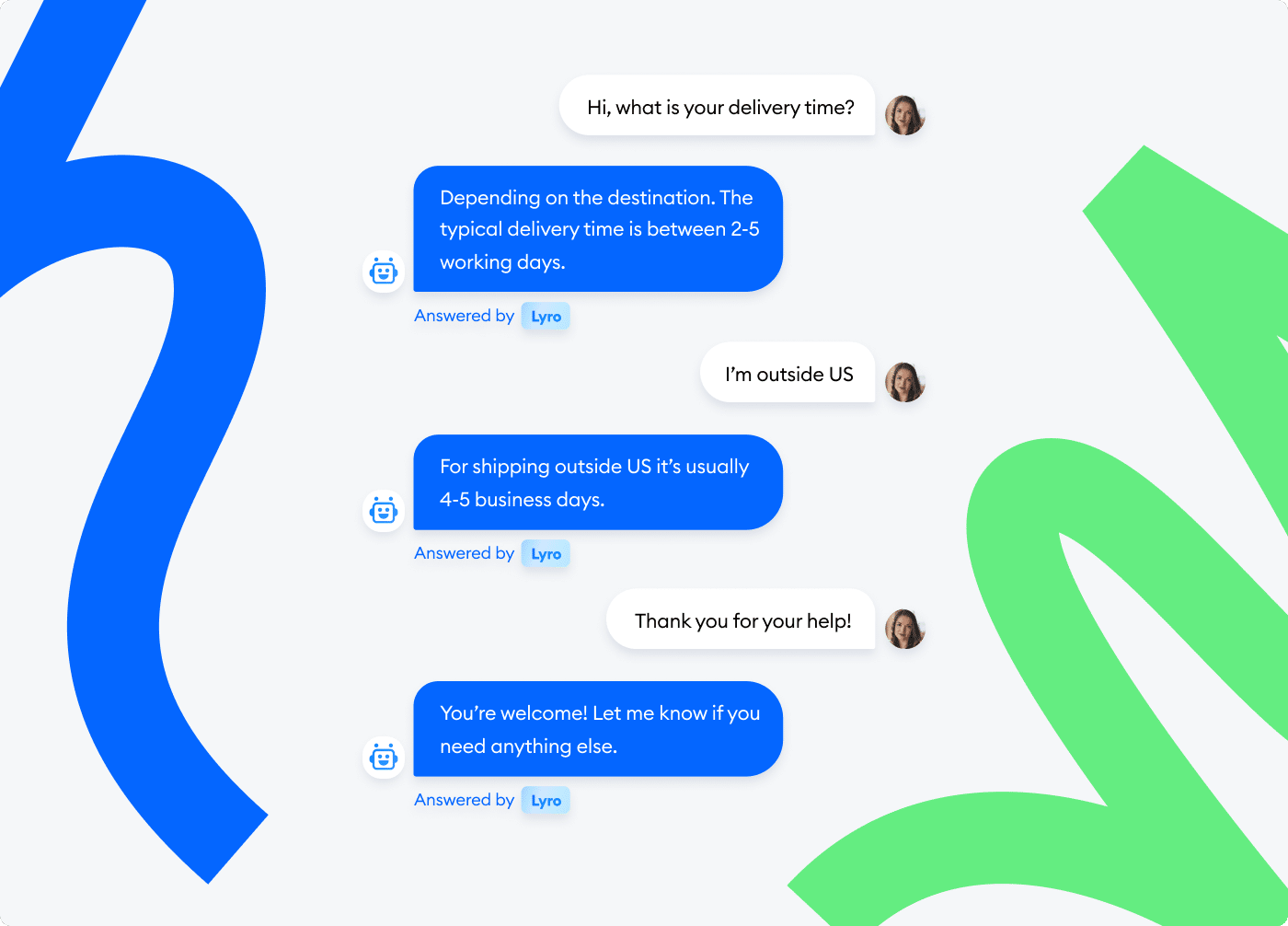
Rating: 4.7/5 ⭐️ (1,630+ reviews)
This is one of the best AI tools for ecommerce with a conversational AI chatbot that frees up to 70% of your customer support workload through automated human-like responses. Also, it can respond to multiple customers simultaneously, run checks on order statuses, create tickets, and much more.
Tidio helps decrease waiting times by up to 97% which boosts customer satisfaction. Moreover, the platform generates leads from visitor inquiries, recommends new products to clients in real time, and reduces shopping cart abandonment. Whichever channel you rely on to sell your product, you can track tickets and follow up on customer queries from a single platform.
Main features:
- Customizable chat widget
- Post and pre-chat surveys
- Ecommerce chatbot templates
- AI and NLP chatbots available
- Android and iOS mobile integration
- 7-day free trial available
- Free version available
- Starter ($24.17/mo)
- Growth (starts at $49.17/mo)
- Plus (starts at $749/mo)
- Premium (starts at $2999/mo)
How to use this AI tool for ecommerce?
For starters, you can use Tidio’s AI-powered chatbots to generate new leads, minimize shopping cart abandonment, and recommend new products to shoppers. A Swedish store Wulff Beltton used this to the brand’s advantage and recorded a 4.5/5⭐ customer satisfaction score after switching to Tidio.
Read more: Learn how to use Tidio’s AI chatbot, Lyro, to its full potential. Discover Tidio’s integration with Shopify and how you can connect your store to the platform easily.
2. Jasper
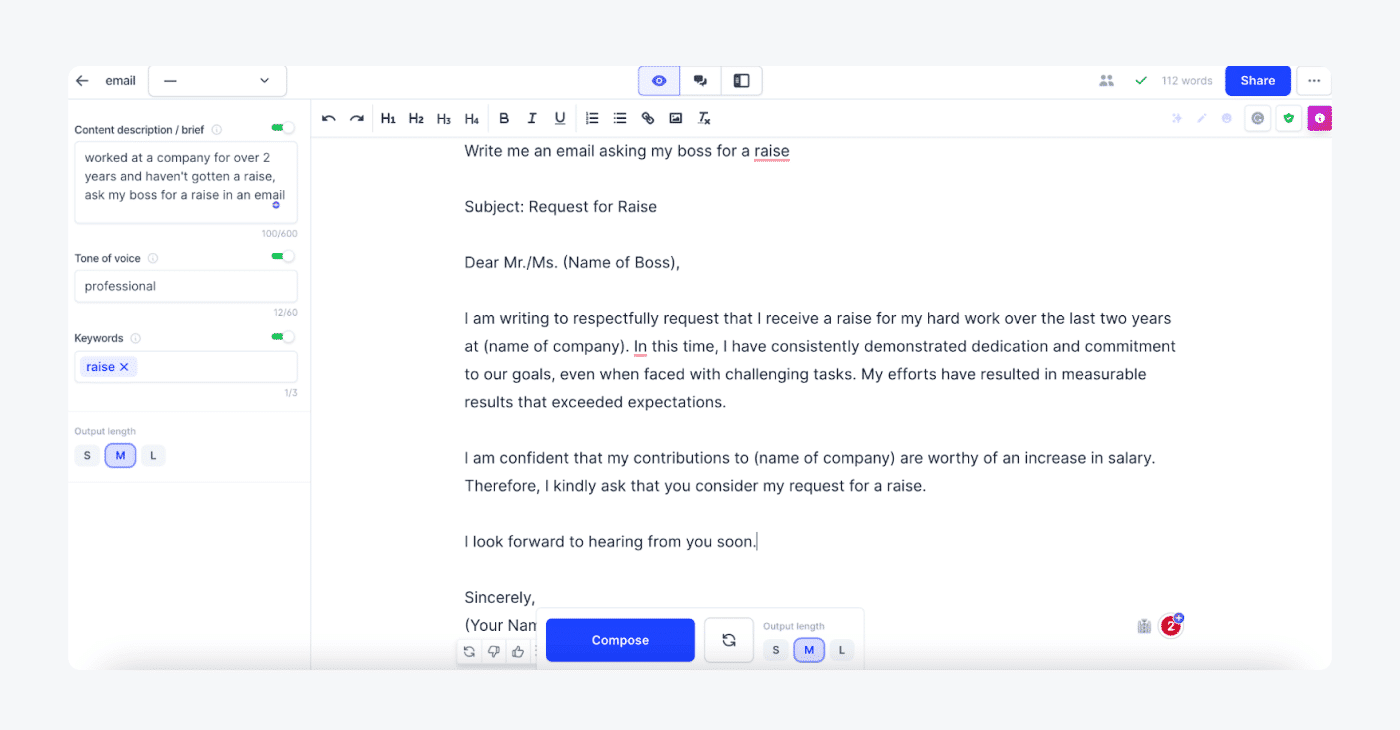
Rating: 4.7/5 ⭐️ (1,250+ reviews)
Jasper is an AI-driven software for marketers facing the ever-growing content generation needs and speed-to-market demands. It’s a game-changer for ecommerce brands who want to speed up copywriting and want to create multiple product descriptions without hassle. You can utilize its dynamic chatbot templates and workflows to create content on your preferred platform, whether that’s X, Amazon, or YouTube.
This AI for ecommerce websites enables you to converse, ask questions, seek advice, brainstorm ideas, or generate blog posts and FAQs. Jasper’s artificial intelligence functionality can save you time and resources when getting your product showcased in the market.
Pros:
- Dynamic templates
- Easy-to-use interface
- Voice-functionality
Cons:
- Writing inconsistencies affect the overall quality of the output
- Limited AI capability when compared to GPT-4+ and Gemini
- Creator ($49/mo/user)
- Pro ($69/mo/5 users)
- Business → contact sales team
How to use this AI in ecommerce?
Jasper comes in handy for marketing teams looking to generate social media captions, write up ad copies, press releases, blog posts, and chat. For example, Cushman & Wakefield saved tens of thousands of hours in manual report writing and content creation that gained the brand a competitive edge in the market.
Read more: Check out the best shopping bot software for online shopping
3. Optimonk

Rating: 4.8/5 ⭐️ (150+ reviews)
Optimonk is accurately categorized as a conversion rate optimization (CRO) software. You get to create entire website sections with personalized offers and messages. Scroll through hundreds of customizable pre-designed templates suited for any campaign. Using the drag-and-drop editor you can create pop-ups in the form of list builder forms, surveys, or special offers that you can embed into your website.
Overall, this is one of the free AI tools for ecommerce that helps businesses in lead generation, reducing cart abandonment, and seamlessly upselling as well as cross-selling special offers. It also lets you send more effective communication to your target audience by using a variety of rules.
Pros:
- Smart pop-ups and A/B testing
- Customer segmentation tools and targeting rules
- Smart product page optimizer
Cons:
- Configuration complexities
- Limited font and language support
- Free
- Essential ($29/mo)
- Growth ($99/mo)
- Premium ($249/mo)
- Master → contact sales team
How to use this AI tool for ecommerce?
Optimonk is a good system to add for ecommerce platforms, marketers, and direct-to-consumer brands. For example, by featuring dynamic content in their headlines, Bukvybag, a bag retailer, recorded a 45% increase in order volumes ever since using the software.
Read more: Learn more about conversational commerce from this guide.
4. Freepik AI Background Remover

Rating: 4.7/5 ⭐️ (130+ reviews)
The Freepik AI Background Remover is a go-to solution for e-commerce sellers who need clean, professional product photos fast. The tool automatically detects and removes backgrounds from product images.
It works especially well for online stores that sell through marketplaces where clean backgrounds and consistency are key to catching the buyer’s eye. Users can also replace backgrounds with solid colors or Freepik’s stock assets to match seasonal campaigns or brand identity.
Pros:
- Automatic background removal
- AI-powered edge detection
- Smart product page optimizer
Cons:
- Limited manual editing or fine-tuning options
- Best results depend on image quality and contrast
- Free limited usage
- Paid plans starting at $5.75/mo
How to use this AI tool for ecommerce?
This tool cuts down on editing time by automating background cleanup for product shots. It’s great for maintaining a uniform look across your e-commerce catalog and marketing visuals. For instance, small brands use the Freepik AI Background Remover to get marketplace-ready images without hiring a designer.
5. Surfer AI SEO
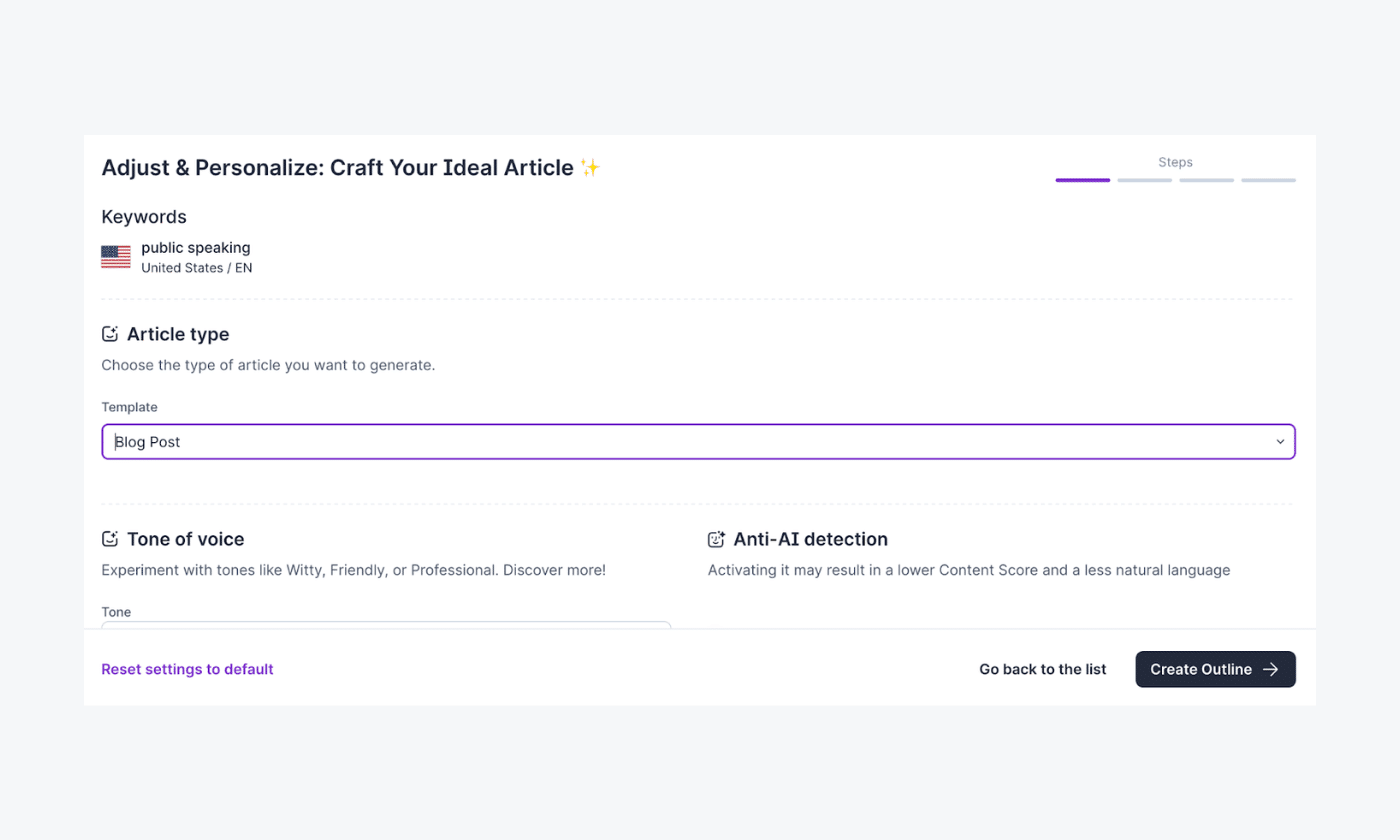
Rating: 4.8/5 ⭐️ (530+ reviews)
Surfer AI ranks among the best AI technologies for writing. It aims to regain productivity lost due to writer’s block and simplify writing for small businesses. This software offers features for SEO optimization such as SERP analyzer and content editor features for keyword research.
Surfer also analyzes on-page optimizations, where suggestions are given on keyword use, media elements, and meta tags that could increase your user retention on page. Furthermore, natural language processing (NLP) techniques employed in its analysis give context and intent behind searches, helping you arrive at content that ranks well and meets reader expectations.
Pros:
- Time-saving SEO-optimized content
- User-friendly and straightforward interface
- Content audit features available
Cons:
- Plagiarism and originality concerns
- Limited features when compared to other tools
- Essential ($99/mo)
- Scale ($219/mo)
- Enterprise → contact sales team
How to use these AI tools for business?
Businesses can use AI systems to evaluate their existing content. For example, brands can run an audit and share recommendations on optimizing the search engine rankings.
Read more: Discover what retail chatbots are with benefits and main features.
6. ViSenze

Rating: 4/5 ⭐️ (2 reviews)
ViSenze is an AI-powered search and discovery CRM that lets you add product discovery to your landing pages. It’s ideal for ecommerce businesses given its ability to amplify your product visibility online. This artificial intelligence tool for ecommerce offers visual search functions that allow customers to look for products through images and text.
On top of that, computer vision and AI deliver smart recommendations that help when upselling and cross-selling your brand’s offerings. You can also use smart tagging that helps when managing and optimizing product images as well as catalogs at scale.
Pros:
- Personalized product discovery
- Smart tagging available
- Visual search for images and text
Cons:
- Occasional lags of the system
- Integration complexities
- Light → contact sales team
- Pro → contact sales team
- Enterprise → contact sales team
How to use these ecommerce AI tools?
Businesses can connect to ViSenze’s API on mobile apps and websites to benefit from product discovery. For example, Myntra, a leading fashion ecommerce brand, has recorded an increase in the annual adoption of its visual image search by 35%.
7. Marketmuse
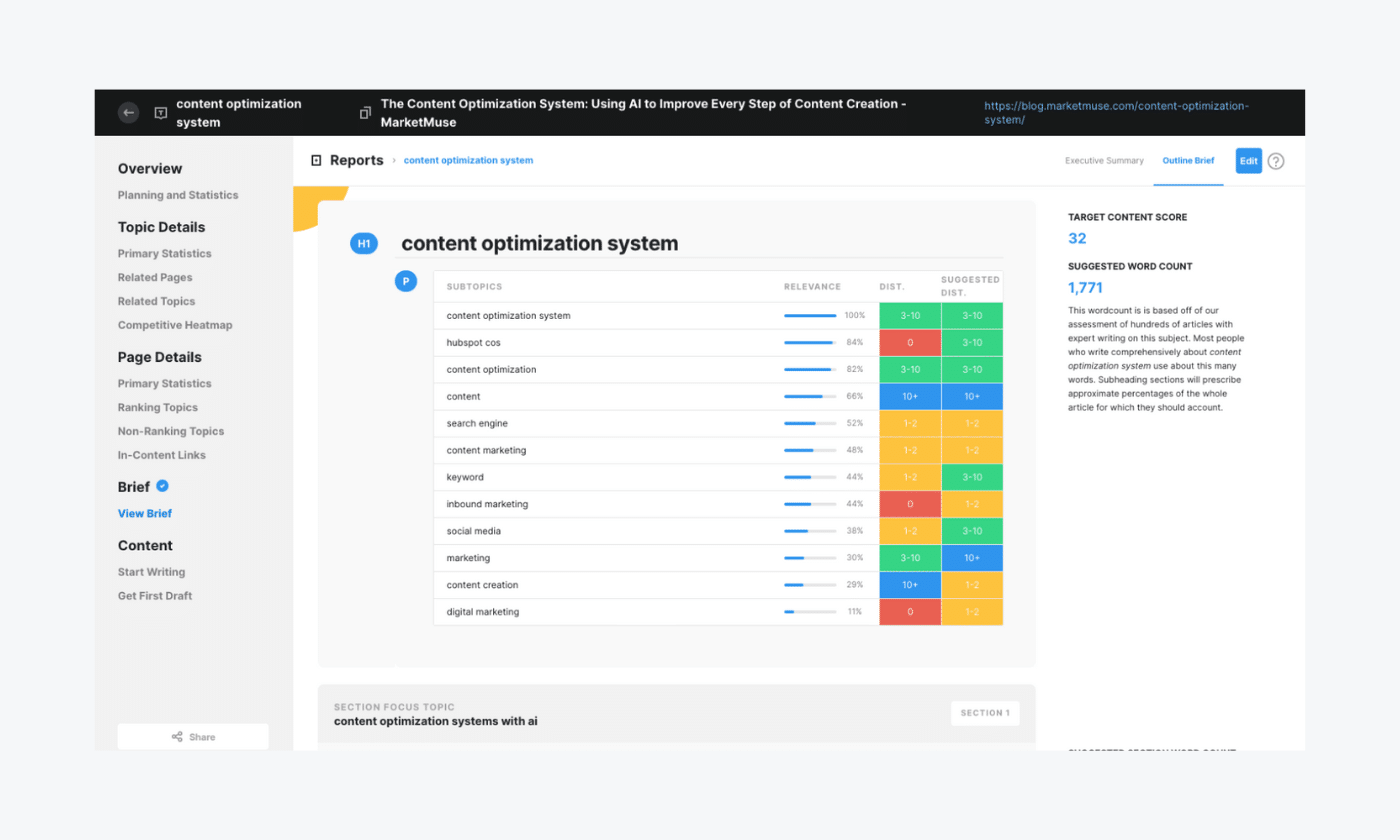
Rating: 4.6/5 ⭐️ (210+ reviews)
Marketmuse is a prolific AI content planning and optimization tool for online businesses. Its AI feature runs through your website and suggests areas to fix.
This is one of the AI ecommerce tools with content analysis that generate keywords and topics, as well as analyze and score your blog pages, helping them rank higher. It also helps you identify potential risks and weaknesses in your content with the site audit feature. This system also allows you create reports based on collected data.
Pros:
- Structured content briefs and optimization
- Gap analysis and keyword research
- Actionable insights available
Cons:
- Data quality shortcomings
- Learning curve involved
- Free plan available
- Contact sales for pricing details
How to use this AI ecommerce platform?
Marketmuse helps in SEO content creation while providing a rough outline of the main topics and keywords. For example, marketers like TentCraft rely on Marketmuse to enhance their service output.
8. Synthesia
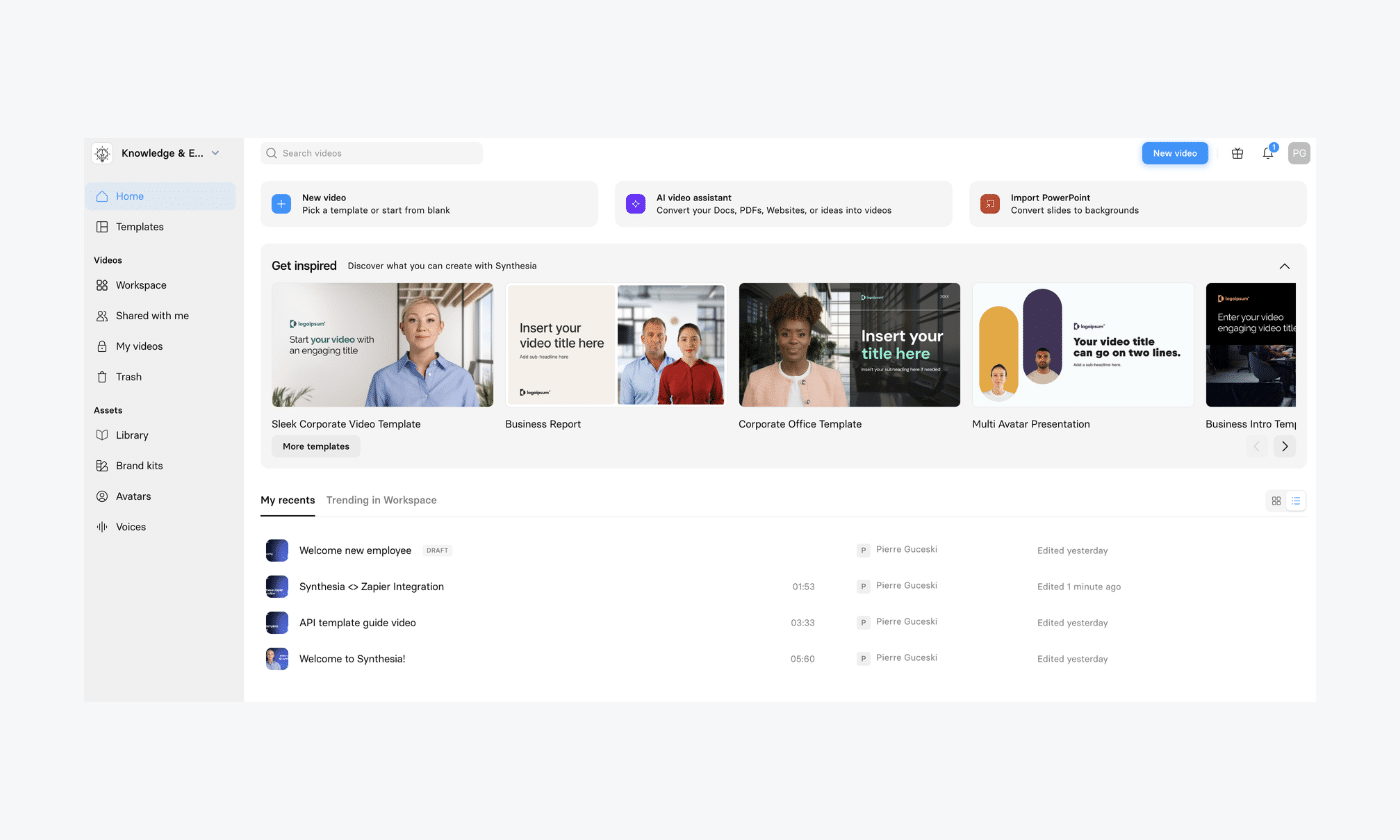
Rating: 4.7/5 ⭐️ (2,040+ reviews)
Synthesia is a cutting-edge text-to-video AI tool. It’s vital for businesses that want to position themselves for modern forms of marketing, such as short-form video clips. Also, the built-in AI software saves you the trouble of costly and time-consuming video shoots by merging people’s lip movements and facial emotions into audio clips.
This is one of the best AI tools for ecommerce that lets you create multiple templates for custom-tailored video content in your product presentations. On top of that, you can use the AI avatars for personalized video experiences.
Pros:
- Streamlined localized content
- Rapid video content creation
- Intuitive and simple to use
Cons:
- Limited AI-generated voiceovers
- Restrictive customization features
- Free version available
- Starter ($29/mo)
- Creator ($89/mo)
- Enterprise → contact sales team
How to use this AI tool for ecommerce?
Synthesia is great for SME companies looking to reach more people with high-quality content yet lacking a huge marketing budget. In a recent case study, Heineken adopted Synthesia to train and mentor 70,000 people working on their supply chain process.
9. Salesforce Einstein
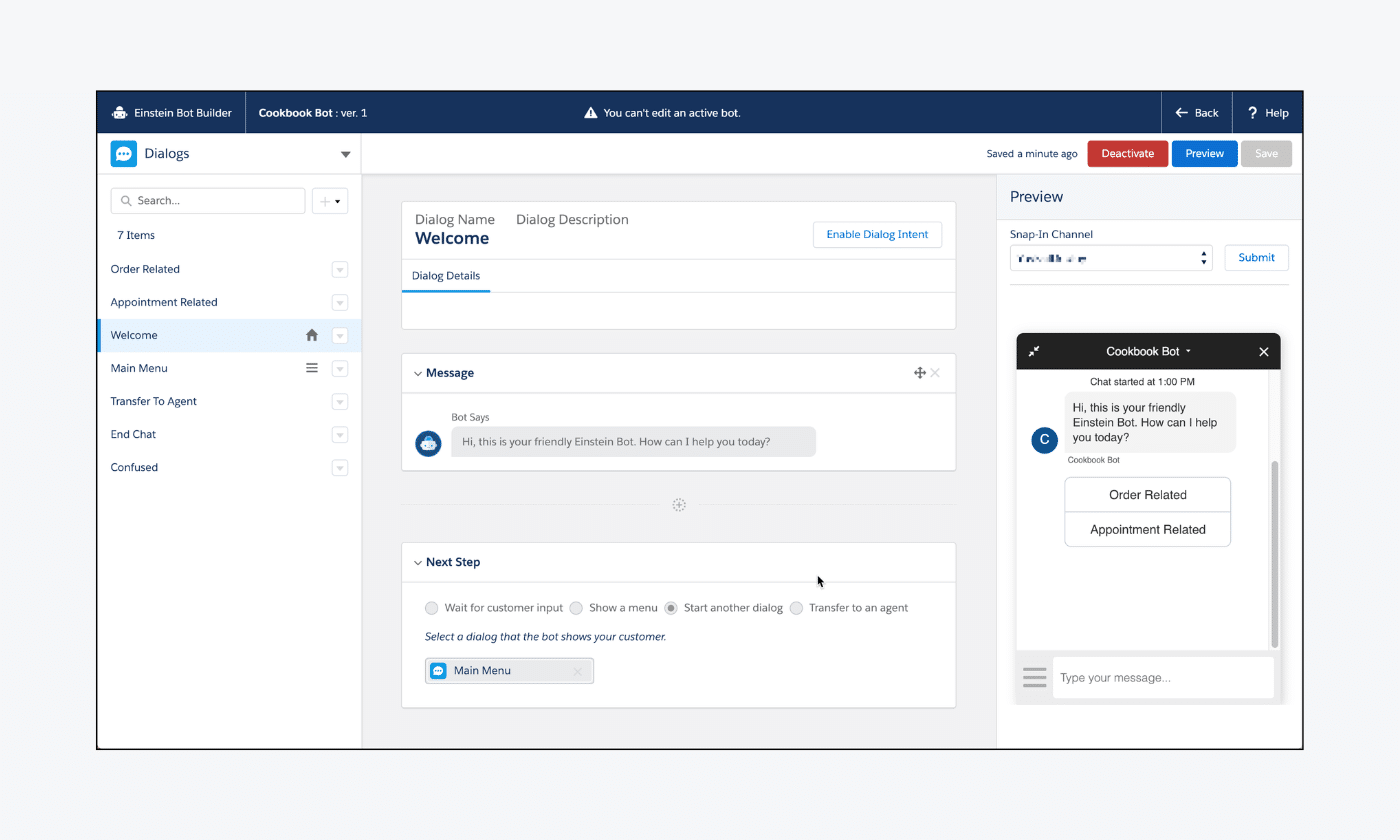
Rating: 4.4/5 ⭐️ (5,610+ reviews)
Salesforce Commerce Cloud Einstein is a great software for building personalized buyer and merchant experiences. The key features include a copilot feature for virtual shopping assistants and a generative AI you can leverage in automating web store setups.
This system also offers AI tools for ecommerce businesses that help you with writing product descriptions and merchandising tasks. On top of that, Salesforce checkout has built-in Generative AI that plugs into your customer data and helps to streamline the checkout process.
Pros:
- Personalized customer data insights
- Dynamic automation available
- Enhanced productivity features
Cons:
- Complex initial setup and customization
- Data quality concerns
- Starter Suite ($25/user/month)
- Pro Suite ($100/user/month)
- Commerce Cloud Pay-As-You-Go (1% gross merchandise value)
How to use this AI software for businesses?
Businesses can use Einstein to interact with customers during the sales processes across areas such as sales, marketing, and analytics. For example, Baptist Health South Florida has explored Salesforce in drafting emails, generating subject lines, and making employees more productive.
10. Chatfuel
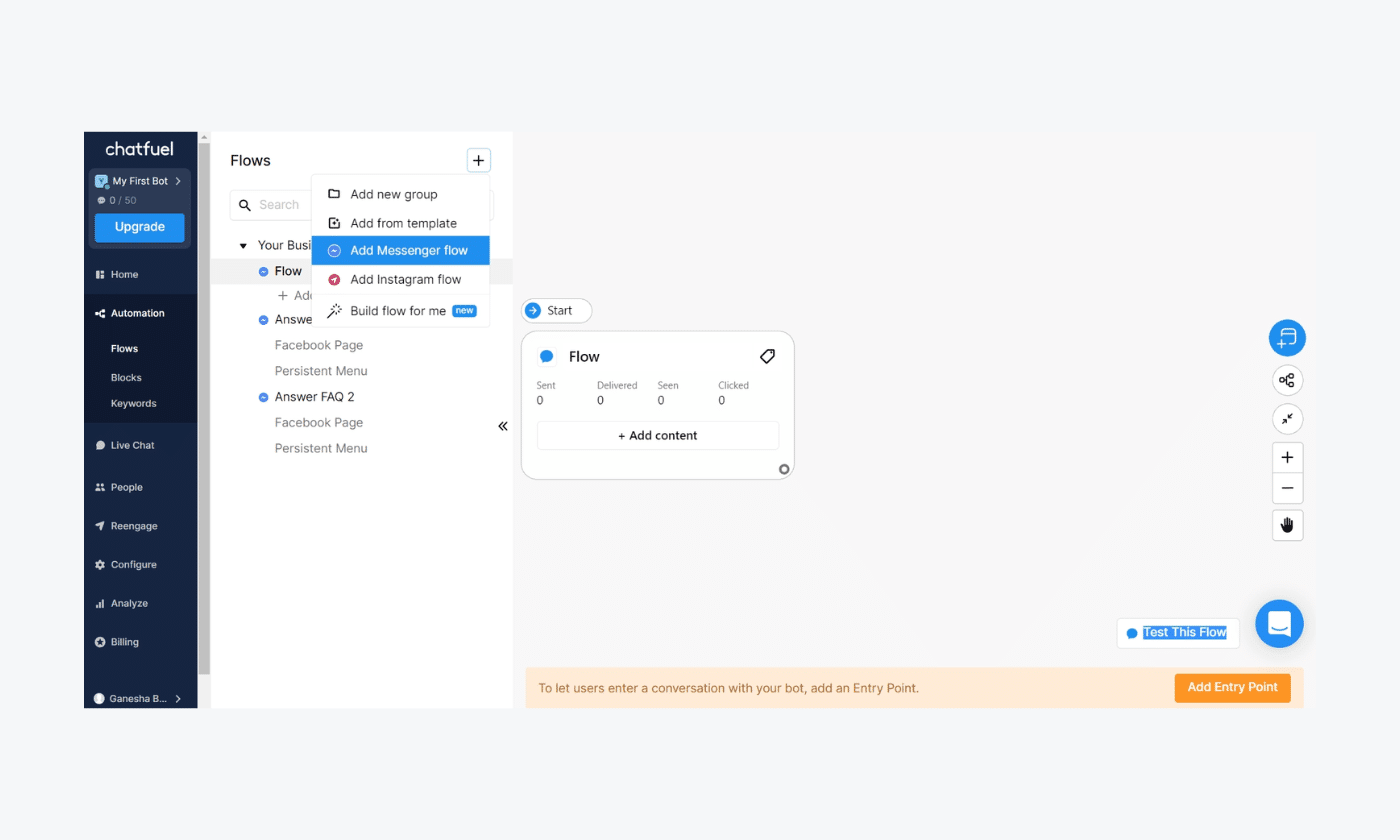
Rating: 4.5/5 ⭐️ (40+ reviews)
Chatfuel is an AI sales assistant helping businesses with their customer service efforts. It’s a no-code software tailored towards ecommerce-driven SMBs with AI integration features and chatbots that help shoppers throughout the sales cycle.
Chatfuel can be integrated with Messenger, Facebook, WhatsApp, and Instagram. On top of that, the AI customer service agents are focused on your sales workflow involving cross-selling, follow-ups, frequently asked questions, automated bookings, and much more.
Pros:
- Personalized recommendations
- Improved customer engagement
- Automated customer interactions
Cons:
- Timely initial setup
- Focuses on social media
- Business ($23.99/mo)
- WhatsApp Business ($34.49/month)
- Enterprise ($300/mo)
How to use this AI tool for ecommerce?
Chatfuel helps ecommerce businesses automate their customer engagement. It can be applied across most end customer-facing B2C industries given its knack for personalization and contextual engagement. KLM recorded a 40% increased volume of customer interactions since opting for a messenger chatbot to the point that 15% of boarding passes were sent via its chatbot.
11. Pixelcut
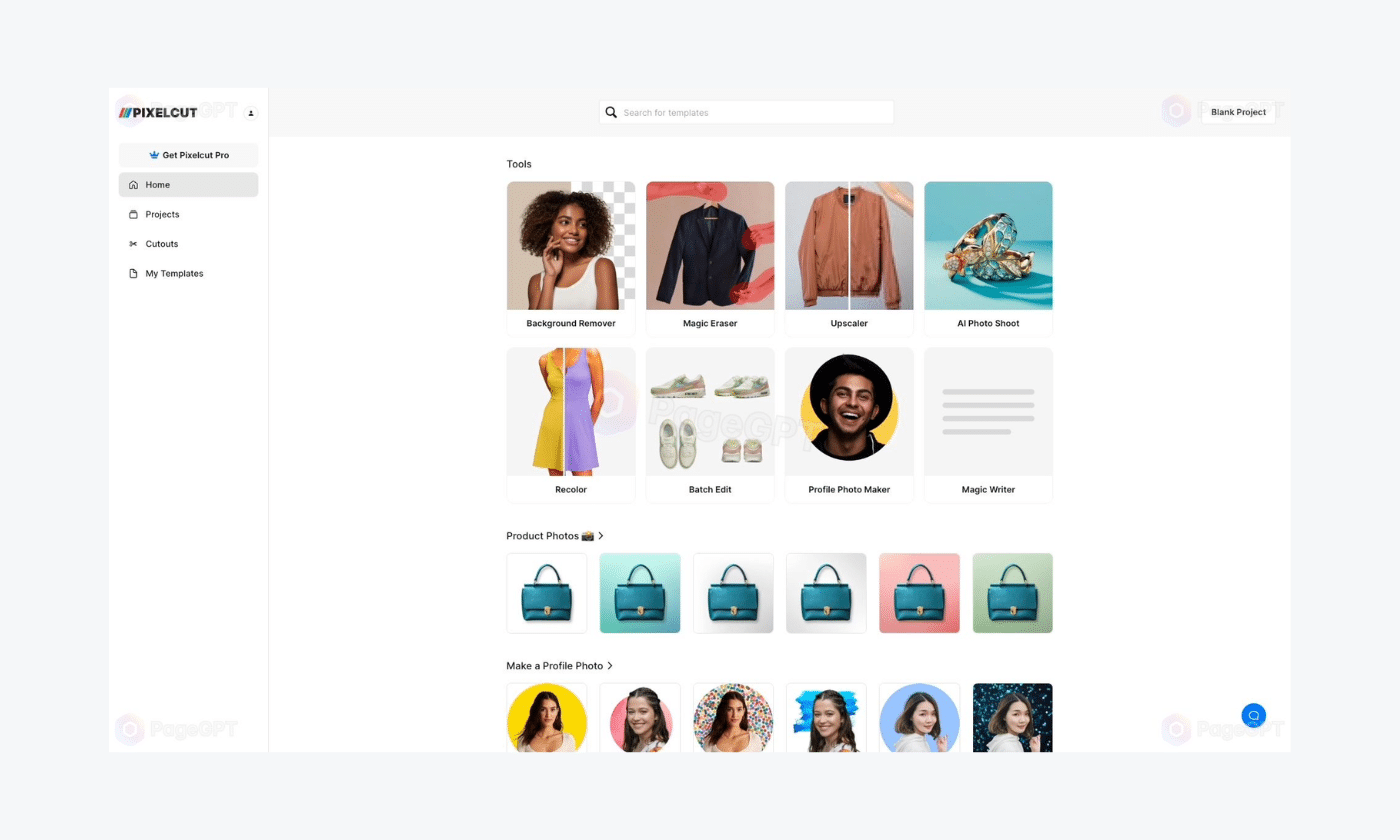
Rating: 4.7/5 ⭐️ (187,000+ reviews)
Pixelcut is a generative AI photo editing software application. It’s a handy tool for an ecommerce company when editing products and images. Using the app’s photo editor, you can highlight things to be removed or edit the background of an image.
Part of the Pixelcut’s appeal is the built-in AI for enhancing images. Not to mention the variety of professionally designed templates that enhance conversion. Finally, just about anyone can use this tool.
Pros:
- AI-powered photo editor
- Precision background removal
- Intelligent image expansion
Cons:
- Limited human touch
- Constraints on file sizes
- Free to use
How to use this AI tool for ecommerce?
Businesses can use this software to save time and money on photo enhancement. The edited images are great for marketing and advertising and can be optimized for consistency on their websites.
How to choose the right tool for your business?
Choosing the right AI tool for your ecommerce business starts with clearly defining your goals. Are you aiming to improve customer support, personalize shopping experiences, or automate marketing?
Different tools serve a variety of purposes—chatbots handle customer queries, recommendation engines boost upsells, while predictive analytics can forecast demand. Once you know your priorities, look for tools that integrate seamlessly with your current tech stack (like Shopify or your CRM) and are easy for your team to adopt.
It’s also crucial to consider scalability, real-world performance, and ROI. Also, don’t forget data privacy. Make sure the provider complies with regulations like GDPR and offers transparency around data handling.
Ultimately, the best AI tool is one that aligns with your needs, delivers measurable impact, and supports your team without unnecessary complexity.
Key takeaway: best AI tools for ecommerce
AI adoption in ecommerce is now mainstream as digital storefronts work to stand out in the market by providing better shopper experiences. As long as you have some digitized form of operations, an AI application can be integrated to enhance the overall sales experience for both the customer and marketing agent.
Additionally, this technology can be utilized to cut down on expenses. Recognizing even the smallest changes in customer behavior can enable you to execute successful predictive marketing that presents your products when and where they are most relevant.
For example, Lyro can recommend relevant products to your clients while they’re browsing your website. It will use the data collected on the shopper from their journey on your site and send personalized messages to engage the person and push them further down the funnel.
Are you ready to boost sales and improve your customer support efforts?
Start leveraging AI for automating your ecommerce customer service
FAQs
Three of the best AI tools for ecommerce are Tidio’s Lyro, Jasper AI, and Optimonk.
Ecommerce businesses can use AI for customer communication and engagement. On top of that, AI can be used for optimizing data collection and analytics, as well as product marketing.
The main benefits of using AI tools for ecommerce are improved customer experience, higher personalization, increased efficiency, better analytics, and higher security levels.
Some of the most common privacy and security concerns include data breaches and unauthorized access to personal information. To prevent them, businesses need to use AI tools compliant with GDPR, CCPA, and LGPD.
Yes, a small business can afford AI tools. The costs for AI platforms start as low as $29 per month for artificial intelligence technology.
You can use AI in ecommerce for streamlining operations, automating repetitive tasks, and improving data organization.

